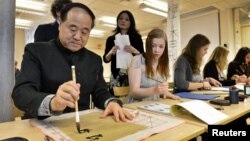Chinese author Mo Yan, who has been criticized for his links to the country's Communist leaders, defended state censorship and avoided discussing human rights issues as he prepared to accept the Nobel prize in literature.
A visibly uncomfortable Mo, whose pen name means "don't speak," told reporters at a press conference in Stockholm on Thursday that censorship is sometimes necessary, comparing it to airport security checks.
"I've never given any compliments to the system of censorship, but I also believe that censorship exists in every country of the world," he said. "The only difference is the degree and way in which censorship happens."
The 57-year-old author, who will receive the Nobel prize Monday, suggested he would not sign a petition by 134 fellow Nobel laureates calling for the release of Liu Xiaobo, the Nobel Peace Prize winner serving an 11-year prison term for inciting subversion.
Mo, who is reluctant to speak against Chinese leaders, surprised his critics in October when he said he hoped Liu could achieve his freedom as soon as possible. But on Thursday, he refused to support Liu again, saying he had already issued his opinion on the matter.
"I have always been independent," he said. "I like it that way. When somebody forces me to do something, I will never do it. When I want to speak, I will speak. When I am forced to express my opinion, I will not do it.
Joshua Rosenzweig, a Hong Kong-based human rights analyst, said in an interview with VOA that is difficult to tell Mo's stance on Beijing's political repression of dissidents and artists.
"Many people interpreted [Mo's remarks] as sympathetic, as saying he wished [Liu] could be released from prison," said Rosenzweig. "But others have interpreted that as he wished that Liu Xiaobo would not criticize the government and would repent of his actions and therefore be released by the government."
Rosenzweig also questioned Mo's comparison of state censorship policies to those meant to protect against terrorism.
"Censorship in China is designed primarily to protect the state from being criticized, whereas we get patted down on an airplane to protect us all from acts of terrorism or other dangers," he said. "The 'danger' here that the security laws and censorship laws in China are designed to prevent are dangers to the political regime, rather than danger to individuals."
Several Chinese dissidents, including artist Ai Weiwei and activist Hu Jia, have said that Mo is unworthy of winning the prestigious Nobel literature prize because of his political affiliations and reluctance to speak on human rights.
Mo, who was accompanied on the trip to Sweden by a Chinese government official, told reporters that he received the prize because of his literary works, not for his politics.
A visibly uncomfortable Mo, whose pen name means "don't speak," told reporters at a press conference in Stockholm on Thursday that censorship is sometimes necessary, comparing it to airport security checks.
"I've never given any compliments to the system of censorship, but I also believe that censorship exists in every country of the world," he said. "The only difference is the degree and way in which censorship happens."
The 57-year-old author, who will receive the Nobel prize Monday, suggested he would not sign a petition by 134 fellow Nobel laureates calling for the release of Liu Xiaobo, the Nobel Peace Prize winner serving an 11-year prison term for inciting subversion.
Mo, who is reluctant to speak against Chinese leaders, surprised his critics in October when he said he hoped Liu could achieve his freedom as soon as possible. But on Thursday, he refused to support Liu again, saying he had already issued his opinion on the matter.
"I have always been independent," he said. "I like it that way. When somebody forces me to do something, I will never do it. When I want to speak, I will speak. When I am forced to express my opinion, I will not do it.
Joshua Rosenzweig, a Hong Kong-based human rights analyst, said in an interview with VOA that is difficult to tell Mo's stance on Beijing's political repression of dissidents and artists.
"Many people interpreted [Mo's remarks] as sympathetic, as saying he wished [Liu] could be released from prison," said Rosenzweig. "But others have interpreted that as he wished that Liu Xiaobo would not criticize the government and would repent of his actions and therefore be released by the government."
Rosenzweig also questioned Mo's comparison of state censorship policies to those meant to protect against terrorism.
"Censorship in China is designed primarily to protect the state from being criticized, whereas we get patted down on an airplane to protect us all from acts of terrorism or other dangers," he said. "The 'danger' here that the security laws and censorship laws in China are designed to prevent are dangers to the political regime, rather than danger to individuals."
Several Chinese dissidents, including artist Ai Weiwei and activist Hu Jia, have said that Mo is unworthy of winning the prestigious Nobel literature prize because of his political affiliations and reluctance to speak on human rights.
Mo, who was accompanied on the trip to Sweden by a Chinese government official, told reporters that he received the prize because of his literary works, not for his politics.





